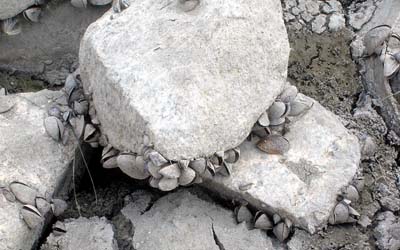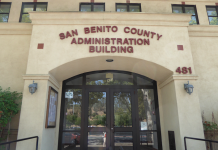It has been almost four years since the discovery of invasive
zebra mussels at the San Justo Reservoir, and it appears San Benito
County officials are losing patience with the federal
government.
It has been almost four years since the discovery of invasive zebra mussels at the San Justo Reservoir, and it appears San Benito County officials are losing patience with the federal government.
The board at Tuesday’s meeting is expected to approve a resolution, put forward by Supervisor Anthony Botelho, that calls for the Gov. Jerry Brown to declare a statewide emergency over the zebra mussel infestation near Hollister and the presence of other non-native mussels in other areas of California.
Zebra mussels were discovered at San Justo Reservoir in January 2008 – the first such revelation in California. Since then, the recreational spot has been closed to the public, and the U.S. Bureau of Reclamation’s efforts to eliminate the species have failed to rid the mussels.
Mussel eradication is extremely difficult, and damage from infestation can cause millions of dollars in damage. Most recently, county water district officials have focused on the use of a substance called potassium chloride to kill them. It needs federal approval, however, and local leaders don’t expect to see it possibly applied until the fall of 2012.
The process has been slower moving than originally anticipated, as locals have been broaching the idea since May 2009 for use of the potash. The county water district also drew down the reservoir’s water level in 2010, but it can’t be drained completely so it was a futile effort.
“They’re taking a real non-approach,” Botelho said, regarding the bureau of reclamation. “There’s nothing going on. Other than monitoring the situation and people that use boats and fishing in other lakes in the state, they don’t do a whole lot.”
Botelho and other local leaders hope the state can help apply pressure on the federal government. The resolution under consideration at the 9:30 a.m. meeting notes that the zebra or quagga mussels have been found in San Diego, Riverside, San Bernardino, Orange and San Benito counties. Aside from being non-native to the food chain, the mussels can cause severe clogging to pipelines, infest hydropower infrastructure and “foul” beaches, according to the county’s resolution.
Botelho pointed out that San Benito County’s proposed resolution largely mirrors similar legislation from Lake County.
The board in the document requests the state to declare a statewide emergency, which can open the door to more significant federal funding, and that the governor request a similar presidential proclamation. Some of the requested actions include:
– Legislation to allow local jurisdictions the same enforcement powers as the state to tag and quarantine boats with possible infestation
– Increase prevention funding such as legislation to increase registration fees for water craft and adding fees for distribution billing
– Implement a statewide program acknowledging water craft as a vector for disease, with a long-term goal of allowing water craft classified as “vector-free” into water bodies
– Encourage collaboration and sharing of funding sources
– Include an aggressive educational component to ensure that dangers with mussels are well understood
– A required 30-day quarantine for all water craft leaving areas infested with mussels
It is not just officials in San Benito County concerned, either. Supervisor Margie Barrios said she and others received a presentation last week at a California State Association of Counties meeting, “and how we’re not really being careful enough.”
“We’re containing them, not eradicating,” Barrios said. “There’s a great concern for me locally and also for the state.”










